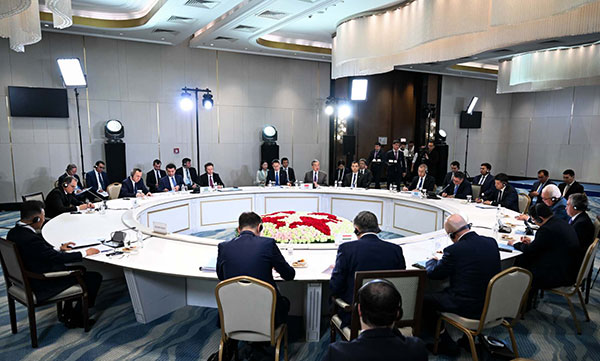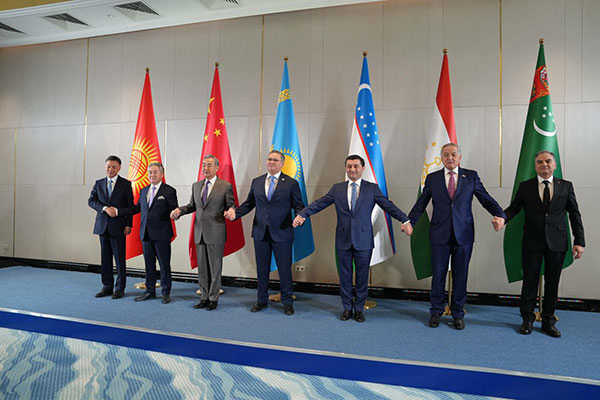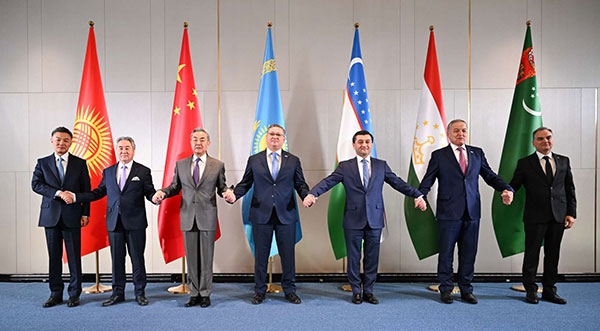
The People’s Republic of China


On April 26, 2025 local time, the Sixth China-Central Asia Foreign Ministers' Meeting was held in Almaty. Member of the Political Bureau of the CPC Central Committee and Foreign Minister Wang Yi, Deputy Prime Minister and Minister of Foreign Affairs of Kazakhstan Murat Nurtleu, Minister of Foreign Affairs of Kyrgyzstan Jeenbek Kulubaev, Minister of Foreign Affairs of Tajikistan Sirojiddin Muhriddin, Minister of Foreign Affairs of Uzbekistan Bakhtiyor Saidov, representative of Turkmenistan and Secretary-General of the China-Central Asia mechanism jointly attended the meeting. This China-Central Asia Foreign Ministers' Meeting laid the comprehensive political groundwork for the upcoming second China-Central Asia Summit later this year and facilitated in-depth discussions on advancing China-Central Asia cooperation in all aspects.
Wang Yi said that at present, changes of the world, of the times, and of historical significance are unfolding like never before. Unilateralism and trade protectionism are on the rise at an accelerated pace, and the trend of "anti-globalization" has severely impacted the free trade system. The United States has acted unilaterally to impose tariffs on over 180 countries at will, infringing upon the legitimate rights and interests of these nations, violating World Trade Organization (WTO) rules, undermining the rule-based multilateral trading system, and destabilizing the global economy. China has stepped forward and taken necessary countermeasures, not only to defend its own legitimate rights and interests, but also to safeguard international rules and order as well as international fairness and justice. No matter how the global landscape changes, China, as the world's second-largest economy and a responsible major country, will unswervingly advance high-standard opening-up, seek common development with neighboring countries, and share opportunities with the world, while shouldering its due international responsibilities and fulfilling its international obligations. Wang Yi put forward five proposals from the Chinese side for deepening China-Central Asia cooperation.
First, firmly uphold good faith and foster harmony. China and Central Asian countries should fully leverage the strategic guiding role of head-of-state diplomacy, make sound preparations for the second China-Central Asia Summit, and take the implementation of the common understandings reached between the heads of state as the fundamental principle to strengthen the political foundation of good-neighborliness, friendship, unity, and mutual trust among the six countries. The Chinese side firmly supports the six countries in safeguarding their sovereignty, independence, territorial integrity, and national dignity, and strengthening their collective self-reliance.
Second, stick to mutually beneficial cooperation. China and Central Asian countries should formulate and implement more facilitation measures to further increase the scale of trade and investment. China is ready to import more high-quality, green agricultural products from Central Asia, select and implement a number of high-quality cooperation projects, expand cooperation in emerging fields, and cultivate new quality productive forces for cooperation. The six countries should increase investment in infrastructure and create a three-dimensional, diversified regional connectivity network.
Third, adhere to institutional development. China and Central Asian countries should strengthen coordination, accelerate the development of the mechanism's pillars, and better leverage the role of the ministerial cooperation mechanism in the 12 key areas. Taking the full-scale operation of the mechanism's secretariat as an opportunity, the six countries should promote the secretariat's work to achieve a good start.
Fourth, adhere to fairness and justice. China and Central Asian countries should jointly remember history and commemorate the 80th anniversary of the victory of the World Anti-Fascist War and the 80th anniversary of the founding of the United Nations. Standing on the right side of history and human progress, the six countries should join hands to safeguard the international system with the United Nations at its core and oppose any form of resurgence of fascism and militarism.
Fifth, be firm in friendship for generations. China and Central Asian countries should uphold the values of equality, mutual learning, dialogue and inclusiveness among civilizations, enhance mutual understanding, and ensure that the torch of friendship is passed down through generations. Additional measures should be formulated to facilitate personnel exchanges among the six countries. It is necessary to strengthen cooperation in education and talent training, and cultivate inheritors and successors of the cause of friendship.

The foreign ministers of the Central Asian countries attending the meeting highly appraised the high-level unity and mutual trust with China and the important role of the China-Central Asia mechanism. They supported the building of a community with a shared future with neighboring countries proposed by China. Guided by the common understandings reached between the heads of state of the six countries at the Xi'an Summit, the five Central Asian countries will continue to work with China to firmly support each other on issues concerning their respective core interests and further tap into the potential for cooperation between the two sides, so as to set a new milestone in the building of a China-Central Asia community with a shared future. The Central Asian countries will synergize their development strategies with the Belt and Road Initiative, deepen cooperation in priority areas such as unimpeded trade, industrial investment, connectivity, green minerals, agricultural modernization, and facilitation of personnel exchanges, and achieve sustainable development and common prosperity. They will work with China to combat the "three forces" of terrorism, extremism and separatism and transnational crimes to safeguard regional peace and tranquility.
All parties welcome the full-scale operation of the secretariat of the China-Central Asia mechanism and will fully support the secretariat in playing an active role in promoting China-Central Asia cooperation.
All parties believe that China is a stabilizing factor in a turbulent world and has played a demonstrative role in multilateralism. All parties reaffirmed their support for multilateralism and strengthened dialogue and cooperation within the framework of the United Nations and others. All parties expressed their support for international trade rules and do not recognize the practice of unilateralism and protectionism. They will strengthen coordination in this regard, safeguard their legitimate rights and interests, and promote unimpeded regional trade.
The meeting issued a press release.
During the meeting, Wang Yi held bilateral meetings respectively with the foreign ministers of the Central Asian countries present.




